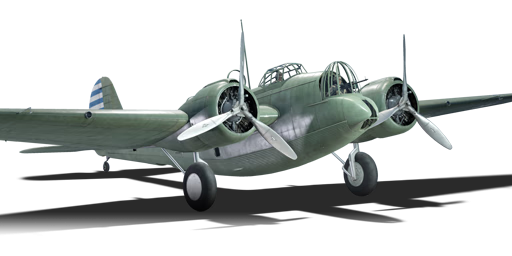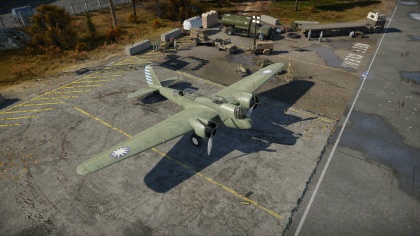Martin 139WC
Contents
| This page is about the Chinese bmober Martin 139WC. For other version, see B-10B. |
Description
The Martin 139WC is a rank I Chinese bomber
with a battle rating of 1.3 (AB/RB) and 1.7 (SB). It was introduced in Update 1.91 "Night Vision".
General info
Flight performance
Describe how the aircraft behaves in the air. Speed, manoeuvrability, acceleration and allowable loads - these are the most important characteristics of the vehicle.
| Characteristics | |||||||
|---|---|---|---|---|---|---|---|
| Stock | |||||||
| Max Speed (km/h at 2,438 m) |
Max altitude (meters) |
Turn time (seconds) |
Rate of climb (meters/second) |
Take-off run (meters) | |||
| AB | RB | AB | RB | AB | RB | ||
| 353 | 340 | 7380 | 21.9 | 22.7 | 5.6 | 5.6 | 600 |
| Upgraded | |||||||
| Max Speed (km/h at 2,438 m) |
Max altitude (meters) |
Turn time (seconds) |
Rate of climb (meters/second) |
Take-off run (meters) | |||
| AB | RB | AB | RB | AB | RB | ||
| 389 | 370 | 7380 | 20.1 | 21.0 | 10.5 | 7.7 | 600 |
Details
| Features | ||||
|---|---|---|---|---|
| Combat flaps | Take-off flaps | Landing flaps | Air brakes | Arrestor gear |
| ✓ | ✓ | ✓ | X | X |
| Limits | ||||
|---|---|---|---|---|
| Wing-break speed (km/h) |
Gear limit (km/h) |
Combat flaps (km/h) |
Max Static G | |
| + | - | |||
| 340 | ~6 | ~3 | ||
| Optimal velocities | |||
|---|---|---|---|
| Ailerons (km/h) |
Rudder (km/h) |
Elevators (km/h) |
Radiator (km/h) |
| < 200 | < 270 | < 290 | > 307 |
| Compressor (RB/SB) | ||
|---|---|---|
| Setting 1 | ||
| Optimal altitude | 100% Engine power | WEP Engine power |
| 2,200 m | 740 hp | 844 hp |
Survivability and armour
The Martin 139WC does not have any armour. There are 4 self-sealing fuel tanks, with 2 in each wing.
Modifications and economy
Armaments
Suspended armament
The Martin 139WC can be outfitted with the following ordnance:
- 6 x 100 kg SAP 100 bombs (600 kg total)
- 6 x 100 kg №.1 bombs (600 kg total)
- 2 x 200 kg №.1 bombs (400 kg total)
- 2 x 250 kg GP 250 bombs (500 kg total)
Defensive armament
The Martin 139WC is defended by:
- 1 x 7.62 mm Browning machine gun, nose turret (600 rpg)
- 1 x 7.62 mm Browning machine gun, dorsal turret (600 rpg)
- 1 x 7.62 mm Browning machine gun, ventral turret (600 rpg)
Usage in battles
Describe the tactics of playing in the aircraft, the features of using aircraft in a team and advice on tactics. Refrain from creating a "guide" - do not impose a single point of view, but instead, give the reader food for thought. Examine the most dangerous enemies and give recommendations on fighting them. If necessary, note the specifics of the game in different modes (AB, RB, SB).
As a bomber, the Martin 139WC does the job well. It can easily reach bombing points before interception and can damage a base with two 250kg bombs, and can then turn away and return to base to rearm. If enemy fighters are at altitude, consider using clouds for cover, or entering a shallow dive towards friendly fighters, or the airfield.
This aircraft works very well defensively and can be very effective when flown with a squadmate. As this bomber is very manoeuvrable, it can out-turn most enemy fighters, but lacks the firepower to deal with them effectively, it has no fixed guns and is only equipped with .30 calibre machine guns, and controlling them manually in a dogfight isn't really a viable option. But when playing with a friend, the Martin 139WC can engage a fighter, and while manoeuvring, can draw the enemy into a low energy state, making it a very easy target to take out.
On your own, you can still comfortably dogfight one-on-one with most German and Italian monoplane aircraft, but if this fight is away from friendlies, another enemy fighter could engage with you, and being such a large target, a 2-on-1 fight likely won't go in your favour. As you are a big target, and with two enemies around you, one is likely going to take out a critical component sooner or later.
Try diving towards friendlies before engaging in a dogfight, the closer you are to your allies, the more likely it is that they'll come to your aid, the further away you are, the more likely it is that an enemy will join the fight instead.
If there are no enemies around later on in the match you can attack light ground targets by manually controlling your nose gunner, just make sure to watch out for any trees or ground hazards as there will be a delay before you can switch back to direct control of the aircraft.
Manual Engine Control
| MEC elements | ||||||
|---|---|---|---|---|---|---|
| Mixer | Pitch | Radiator | Supercharger | Turbocharger | ||
| Oil | Water | Type | ||||
| Controllable | Controllable Not auto controlled |
Controllable Not auto controlled |
Controllable Not auto controlled |
Separate | Not controllable 1 gear |
Not controllable |
Modules
| Tier | Flight performance | Survivability | Weaponry | ||
|---|---|---|---|---|---|
| I | Fuselage repair | Radiator | Turret 7 mm | 100 GPs | |
| II | Compressor | Airframe | 200 GPs | ||
| III | Wings repair | Engine | New 7 mm MGs (turret) | MCGP250 | |
| IV | Engine injection | Cover | |||
Pros and cons
Summarise and briefly evaluate the vehicle in terms of its characteristics and combat effectiveness. Mark its pros and cons in the bulleted list. Try not to use more than 6 points for each of the characteristics. Avoid using categorical definitions such as "bad", "good" and the like - use substitutions with softer forms such as "inadequate" and "effective".
Pros:
- Very manoeuvrable, has an impressively high turn rate for a bomber
- The frontal gunner, while only having a .30 cal, can be used as a manual weapon if you keep the front of the plane on an enemies tail, or for attacking ground targets
- As it's a less well-known aircraft, enemies may not know how to effectively fight it
- It can easily take fire from machine guns on the wings, and in general is fairly survivable
- While having limited fire arcs on the rear turrets, they cover a wide area and can surprise enemies that don't know they're there
Cons:
- It's a large target, and even though the critical components are hard to hit individually, the large wings and tail will accumulate damage over time
- MAximum bombload of 2x 250kg bombs is not a lot
- No armor protection at all, leaving it vulnerable to even small-caliber MG.
- Despite its comparatively good speed, most Axis aircraft can catch up to it easily
- Rear gunners have a slightly restricted field of view over the tail, where the gunners can't fire
History
Describe the history of the creation and combat usage of the aircraft in more detail than in the introduction. If the historical reference turns out to be too long, take it to a separate article, taking a link to the article about the vehicle and adding a block "/History" (example: https://wiki.warthunder.com/(Vehicle-name)/History) and add a link to it here using the main template. Be sure to reference text and sources by using <ref></ref>, as well as adding them at the end of the article with <references />. This section may also include the vehicle's dev blog entry (if applicable) and the in-game encyclopedia description (under === In-game description ===, also if applicable).
Media
Excellent additions to the article would be video guides, screenshots from the game, and photos.
See also
- Aircraft of comparable role, configuration and era
External links
Paste links to sources and external resources, such as:
- topic on the official game forum;
- encyclopedia page on the aircraft;
- other literature.
| Glenn L. Martin Company | |
|---|---|
| Attackers | AM-1 |
| Bombers | B-10B · B-26B · PBM-1 · PBM-3 · PBM-5A |
| Jet bombers | B-57A* · B-57B* |
| Export | Martin 139WC · Martin 167-A3 · B-26C |
| * These aircraft were license-built from The English Electric Company Limited who developed and built the British English Electric Canberra. | |
| China bombers | |
|---|---|
| American | Martin 139WC*(␗B-10B) · ␗A-29 · ␗B-25J-30 · ␗PB4Y-2 |
| German | ␗Hs 123 A-1 |
| Soviet | ␗SB 2M-103U · ␗DB-3A · ␗Tu-2S-44 · ␗Tu-4 |
| Japanese | ␗P1Y1 mod. 11 |
| *Export Name | |





